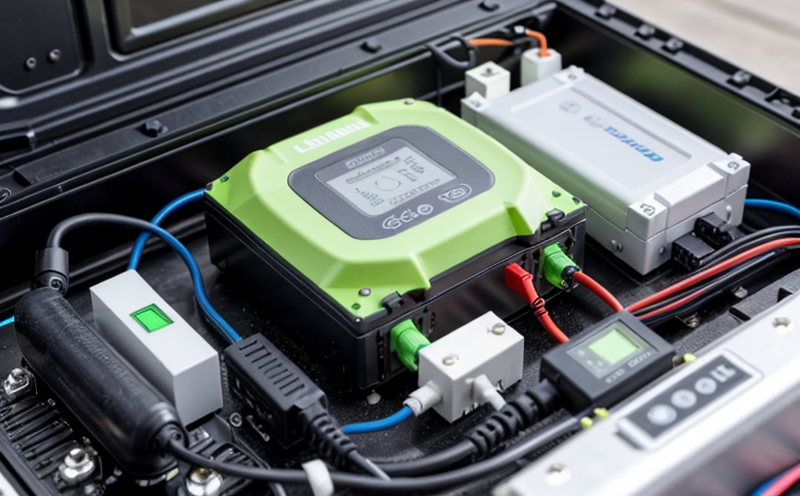UNE EN 62619 Lithium-Ion Battery Testing for Industrial Applications
The UNE EN 62619 standard is a crucial document that sets out detailed guidelines for the testing of lithium-ion batteries intended for industrial applications. This standard ensures that these batteries meet stringent safety and performance criteria, which are essential in industries where reliability and efficiency are paramount.
Lithium-ion batteries play an increasingly vital role in various sectors such as automotive, aerospace, and renewable energy storage systems. In the context of industrial applications, these batteries must be robust enough to withstand harsh environmental conditions and operational stresses while maintaining optimal performance over extended periods. The UNE EN 62619 standard provides a framework for manufacturers to design, manufacture, and test lithium-ion batteries that meet these demanding requirements.
The testing procedures outlined in this standard are comprehensive and cover multiple aspects of the battery's functionality, including electrical safety checks, thermal stability assessments, mechanical durability evaluations, and chemical compatibility tests. These tests aim to identify any potential weaknesses or vulnerabilities early on in the product lifecycle, thereby preventing costly failures later down the line.
One key aspect of UNE EN 62619 is its focus on minimizing risks associated with lithium-ion batteries. This includes addressing concerns about overheating, short circuits, and other hazards that could lead to accidents or malfunctions in industrial settings. By adhering strictly to this standard, manufacturers can demonstrate their commitment to producing safe products that comply with international regulations.
The scope of UNE EN 62619 extends beyond mere compliance; it also serves as a tool for continuous improvement within the industry. Through regular updates and revisions based on emerging trends and technological advancements, this standard remains relevant even as new challenges arise in battery technology development.
Another important feature of UNE EN 62619 is its emphasis on interoperability between different types of lithium-ion batteries used across various industrial sectors. This ensures seamless integration into existing systems without compromising overall system performance or security.
In summary, UNE EN 62619 Lithium-Ion Battery Testing for Industrial Applications provides a robust foundation for ensuring the safety and reliability of these critical components in demanding environments. Its rigorous testing protocols help manufacturers produce high-quality products that meet both local and global standards while fostering innovation within the broader industry ecosystem.
Why It Matters
The importance of UNE EN 62619 Lithium-Ion Battery Testing cannot be overstated, especially given the growing demand for more efficient and sustainable energy solutions across numerous industrial sectors. By implementing this standard, organizations can ensure they are delivering safe, reliable, and compliant products that meet stringent regulatory requirements.
Compliance with UNE EN 62619 helps protect consumers and employees from potential hazards associated with lithium-ion batteries. It also fosters trust among stakeholders by demonstrating a company's dedication to quality assurance practices. Furthermore, adherence to this standard can enhance brand reputation and competitive advantage through consistent performance across different markets.
For manufacturers looking to expand into new regions or tap into emerging industries, compliance with UNE EN 62619 serves as an essential stepping stone towards global market entry. It allows companies to navigate complex regulatory landscapes efficiently while ensuring their products are up-to-date with current industry best practices.
In addition to these benefits, there is also a growing trend toward sustainability within the manufacturing sector. UNE EN 62619 aligns well with this movement by promoting environmentally friendly design principles and reducing waste throughout the battery lifecycle. This makes it an attractive option for companies committed to minimizing their environmental footprint.
Finally, the standard encourages ongoing improvement through regular reviews and updates based on feedback from users and experts in the field. This iterative process ensures that UNE EN 62619 remains relevant as technology evolves and new challenges arise within the industry landscape.
Applied Standards
| Standard Number | Title | Description |
|---|---|---|
| UNE EN 62619:2023 | Lithium-ion batteries - Safety aspects and test methods for industrial applications | This standard provides comprehensive guidelines on testing lithium-ion batteries used in industrial environments. It covers various safety checks, thermal stability assessments, mechanical durability evaluations, and chemical compatibility tests. |
| UNE EN 60349-2:2018 | Battery chargers - Part 2: Safety requirements for battery chargers | This standard specifies additional safety considerations specifically related to the design and operation of battery chargers. |
| UNE EN IEC 62196-3:2020 | Battery pack interconnectors - Particular requirements for industrial applications | This standard addresses specific requirements concerning the construction, testing, and use of battery pack interconnectors in industrial settings. |
| UNE EN 61984-3:2017 | Electrochemical cells - Particular requirements for industrial applications | This standard outlines specific criteria applicable to electrochemical cells utilized within the confines of industrial applications. |
The combination of these standards creates a robust framework that ensures lithium-ion batteries meet all necessary safety and performance criteria required by industrial applications. Each standard contributes uniquely to covering different aspects of battery testing, thereby providing comprehensive protection against potential hazards.
Environmental and Sustainability Contributions
- Promotes efficient energy utilization through reliable battery performance in various industrial sectors.
- Encourages the development of more sustainable manufacturing processes by emphasizing eco-friendly design principles.
- Fosters reduced waste generation throughout the battery lifecycle, from production to disposal.
- Supports the transition towards cleaner and greener technologies by ensuring compatibility with renewable energy systems.
- Aids in minimizing environmental impact during transportation and storage due to enhanced safety features mandated by UNE EN 62619.
By integrating these contributions into everyday operations, companies can significantly reduce their carbon footprint while maintaining high standards of product quality and performance. This aligns with broader efforts aimed at fostering a more sustainable future across all industries.





